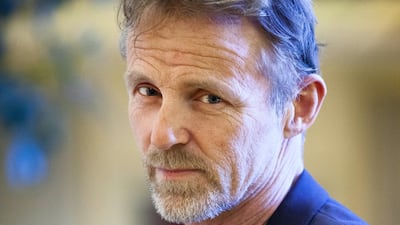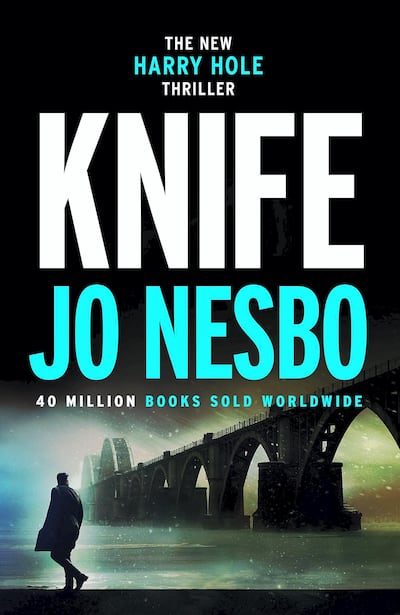If Jo Nesbo fans found their favourite author rather elusive during his brief spell in Dubai this month, it's possibly for their own good. The mind behind more than a dozen mega-selling crime thrillers says he simply keeps his distance to avoid being influenced about where he next takes his character, Oslo detective Harry Hole.
Nesbo says that while some writers enjoy staying in touch with their readers, he prefers to keep his distance.
"Popularity is sort of dangerous and may corrupt you as a writer," he says, moments before a session with an Emirates Airline Festival of Literature audience. "When readers have wishes for your writing, certain preferences, you will start subconsciously obeying them. I just pretend they don't exist, in a way."
Unsurprisingly, he rarely attends literature festivals and Nesbo's Dubai debut came via a rock-climbing trip in Thailand, and before the author set off to explore Ras Al Khaimah's crags. "I didn't have that many readers in the first years and really liked that," Nesbo says.
“It’s the only way I can stay true to the story and my own ideas. They have their ideas of who Harry is, opinions about what is going to happen.
"I'm a friendly guy and like to please people so, based on my weak character and personality, it's better to steer clear."
It's a policy that has served the Norwegian author well – he has sold about 40 million novels, most centred on his emotionally bruised sleuth. But as with many authors, Nesbo didn't always set out to follow this career path.
While raised in a family of storytellers, Nesbo had a promising career as a professional footballer, which was cut short by injury when he was 19. After a period as an economist and freelance journalist, he and friends found chart-topping success as pop / rock band Di Derre, with Nesbo on guitar and vocals. And they are touring again after releasing a successful greatest hits album.
But aren't footballer and musician both gregarious, crowd-pleasing professions that demand the kind of fan participation Nesbo now dodges? "They say writing is for the shy exhibitionists," he says. "Being a musician and writer are very similar jobs, and very different. Playing in front of a crowd is extroverted – being a writer is the opposite.
For me, they balance each other. You don’t get applause when you write a good sentence so it’s great to play a gig and get some applause before you go to bed.
"The similarity is it's about storytelling, trying to get people interested, to convince yourself and your audience the story you have is worth telling and reading."
The first book in Nesbo's Harry Hole series, 1997's The Bat, came about somewhat serendipitously when publishers suggested he write a book about touring. The band went on sabbatical, however, and Nesbo, instead, created Hole. Although he was convinced his "simple" first attempt wouldn't be published, he recalls how the task of writing a novel "felt very natural" to him. "I had experience writing lyrics, like really short stories, so I knew how to tell a story," he says. "But I hadn't experienced that intimacy you have in a crime novel. It's like you have licence to manipulate your reader."
His latest novel, Knife, underlines that point. It caused shock waves among fans last year when it arrived with a bombshell. With his detective's destiny in his hands, you could say Nesbo is effectively playing God. "I don't feel like a god, I feel like a messenger; more a disciple of the crime fiction genre," he says. "There are certain rules in the tradition and a logic and gravity in the kind of story you are telling, which you have to respect."
That said, having been part of his life for so long, Nesbo, at age 59, must feel almost familial attachment to Hole. After all, the detective pays for those climbing boots. "Yes and no," Nesbo says. "The universe of Harry is sort of a room I can go into and lock the door, but I'm very aware he is a fictional character … a means for telling a story.
"They say all writers basically write about themselves and I guess that's true. But it's not like Harry's my alter-ego; he's a tool for, perhaps, telling my point of view.
He’s not a person who I view as a friend. He could be, but he’s the kind of friend that, having spent the weekend with you, doesn’t call back on Monday.”
With countless crime-driven novels and streamed TV shows available, some people have debated the finite nature of originality. For an author occupying such a crowded genre, with pressure to keep producing, does Nesbo not worry his character may run out of fuel?
"For me, there's only lack of time," he says. He has yet to experience anything close to writer's block, he says.
“If I should run out of ideas, I will hopefully stop writing. I would hate to write just because it’s my job, I have to have the feeling I’m improving as a writer and can contribute something new.
"Of course, no ideas are really that fresh. All the good stories are already in the Bible. Take the story of King David … it's what most stories are based on – Breaking Bad, Macbeth.
As a writer, you have to wake up every day with an illusion that you can improve on those stories.”
Certainly a colossal demand for his books remains – Nesbo's novels have been translated into more than 40 languages – and while psychologists could fill conferences debating our insatiable appetite for crime fiction amid real-life shocking and tragic events, some argue the resolutions fiction brings act almost as social balm.
"I have a lot of ideas, but I have no answers I know to be true," Nesbo says.
"It could be that being in the safety of your own house, reading about terrible things happening to other people, is cathartic."
Nesbo pauses briefly when asked whether he ever questions his own state of mind while conjuring the often fraught and intensely dark scenarios into which he thrusts his trusty detective. "Certainly, it is a strange job to wake up in the morning and the first thing you think of is some gruesome murder," he says. "And then, if you come up with something original and horrifying, you're happy."


